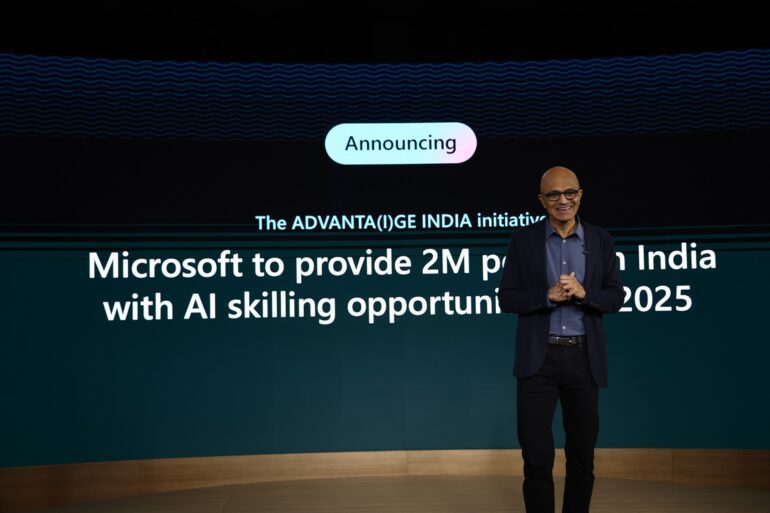TL;DR:
- Microsoft’s ADVANTA(I)GE INDIA initiative aims to skill 2 million individuals in AI by 2025.
- The program aligns with Microsoft’s Skills for Jobs agenda, targeting future-ready skills.
- Focus on Tier 2, Tier 3 cities, and rural areas for inclusive progress.
- Collaboration with government, nonprofits, and corporates for training delivery.
- Emphasis on responsible AI use and creating AI fluency among students.
- Partnerships with Tata STRIVE and government agencies to strengthen workforce and governmental AI capabilities.
- Aim to equip government officers with essential AI knowledge and enhance digital governance.
- Collaborations with nonprofits to maximize social impact through AI transformation.
Main AI News:
In a strategic move to bolster India’s workforce, Microsoft has announced a groundbreaking initiative aimed at equipping 2 million individuals with AI skills by 2025. Termed the ADVANTA(I)GE INDIA initiative, this program is a cornerstone of Microsoft’s Skills for Jobs agenda, tailored to empower India’s workforce with the essential skills for tomorrow’s job landscape. This initiative not only underscores Microsoft’s commitment to fostering AI-driven transformation but also aligns with the company’s ethos of responsible AI deployment.
According to recent findings from Microsoft’s Work Trend Index, a staggering 90 percent of Indian leaders acknowledge the imminent need for new skill sets to navigate the AI-driven future. Moreover, 78 percent of Indian workers feel they lack the requisite AI capabilities for their current roles. Recognizing this glaring skills gap, ADVANTA(I)GE INDIA aims to bridge the divide by focusing on training individuals in Tier 2 and Tier 3 cities, as well as rural areas, thereby fostering inclusive socio-economic development.
The ADVANTA(I)GE INDIA initiative is set to democratize access to AI skills across the nation, reflecting Microsoft’s steadfast commitment to fostering inclusive growth through technology. Puneet Chandok, President of Microsoft India & South Asia, emphasized the transformative potential of AI for India, underscoring the initiative’s goal of cultivating AI fluency at scale. Chandok reiterated that empowering citizens with the right skills is pivotal for India to emerge as a global AI leader.
Ameya Vanjari, COO of Tata STRIVE, echoed these sentiments, stressing the critical need to cultivate a diverse and inclusive talent pool in AI and related fields. Vanjari highlighted Tata STRIVE’s partnership with Microsoft in this endeavor, emphasizing their joint efforts to train students and facilitate job placements, particularly for women and girls.
The ADVANTA(I)GE INDIA initiative will operate across three key domains: empowering India’s future workforce, upskilling government officials, and enhancing the AI capabilities of nonprofit organizations. Microsoft’s collaboration with India’s Ministry of Skill Development and Entrepreneurship, along with partnerships with state governments, underscores its commitment to grassroots skill enhancement.
To achieve its objectives, Microsoft will leverage existing partnerships to provide basic and advanced AI training to half a million students and job seekers in rural vocational education institutions. Moreover, the company plans to offer specialized AI training to 100,000 young women, bolstering their proficiency in cloud, AI, and cybersecurity domains.
In addition to workforce development, Microsoft aims to raise awareness of responsible AI use among school students, laying the groundwork for the next generation of AI innovators. By piloting global initiatives such as TEALS and Farm Beats for Students, Microsoft seeks to empower students in remote and tribal regions with AI literacy and technical skills.
Furthermore, Microsoft’s partnership with India’s National Programme for Civil Services Capacity Building underscores its commitment to enhancing governmental AI capabilities. By equipping government officers with essential AI knowledge, Microsoft aims to catalyze digital governance and citizen service delivery in rural India.
Lastly, Microsoft’s collaboration with nonprofits underscores its commitment to maximizing social impact through AI transformation. Through initiatives like the Generative AI Skills Challenge and the India Nonprofit Leaders Summit, Microsoft aims to equip nonprofits with the tools and resources needed to harness AI for social good.
Conclusion:
Microsoft’s ADVANTA(I)GE INDIA initiative reflects a strategic move towards democratizing access to AI skills in India. By addressing the skills gap and fostering AI fluency across diverse sectors, Microsoft is poised to drive significant socio-economic and technological advancements in the Indian market, positioning itself as a key player in India’s AI-driven future.

